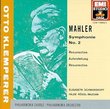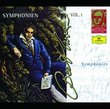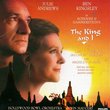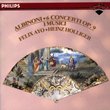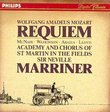| All Artists: Frederic Chopin, Vladimir Horowitz Title: Horowitz Plays Chopin: Mazurkas; Waltzes; Nocturnes Members Wishing: 1 Total Copies: 0 Label: Sony Release Date: 9/30/2003 Album Type: Limited Edition Genres: Dance & Electronic, Classical Styles: Chamber Music, Historical Periods, Classical (c.1770-1830), Modern, 20th, & 21st Century Number of Discs: 1 SwapaCD Credits: 1 UPC: 827969042625 |
Search - Frederic Chopin, Vladimir Horowitz :: Horowitz Plays Chopin: Mazurkas; Waltzes; Nocturnes
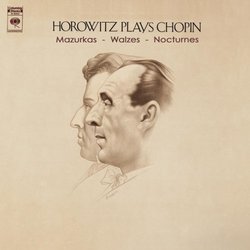 | Frederic Chopin, Vladimir Horowitz Horowitz Plays Chopin: Mazurkas; Waltzes; Nocturnes Genres: Dance & Electronic, Classical
|
Larger Image |
CD DetailsSimilar CDsSimilarly Requested CDs |
CD ReviewsHorowitz's Intimate Chopin Hank Drake | Cleveland, OH United States | 04/28/2007 (4 out of 5 stars) "Vladimir Horowitz, who had a Polish grandmother and was fond of pointing out that he was "half as much a Pole as Chopin", recorded more of Chopin's music than that of any other composer. This CD reissue includes some of Chopin's shorter, more intimate works.
Horowitz considered the Mazurkas to be Chopin's greatest works, and often stated that there was more music in the shortest Chopin Mazurka than in the longest Mahler Symphony. From the time of his 1926 debut in the West, he was justly famous for his performances of the Mazurkas. The pianist treated the Mazurkas less as dance pieces than as "dance-fantasies" and his playing of the works was freer than the more straightforward Rubinstein. Highlights of this set include a seductive F-sharp Minor, Op. 59 No. 3. from 1973, and a brooding C Minor Op. 56, No. 3 from the pianist's last recording in 1989. However, Horowitz live 1987 performance of the B Minor Mazurka, Op. 33, is more flirtatious and interpretively creative than the 1966 version heard here. The A Minor Waltz was recorded at CBS's 30th Street Studio in 1971. The ubiquitous C-sharp Minor Waltz is from the Boston concert of April 7, 1968. Three days previously, the Reverend Martin Luther King had been murdered in Memphis. At the beginning of this concert, Horowitz walked onstage with an African-American minister, and played Chopin's Funeral March in memory of Dr. King. Horowitz was fanatically passionate about Ignaz Friedman's performances of the Nocturnes, but recorded surprisingly few himself. Many of his earlier recordings of the Nocturnes were played on too large a scale, with a prevalent note of hysteria. This is unfortunately true of the Nocturnes recorded in concert in 1966 and 1968. The two Nocturnes from 1989 are another story indeed. There is a rare sense of repose, at times an almost deathly calm, about these performances. There is also Horowitz's rare ability to weight the various elements of melody, harmony, and accompaniment, down to the smallest micron. Horowitz's floating of the top, middle, and lower lines, interweaving them effortlessly, is in many ways more stunning than any kind of thundering virtuosity. Given the difference in recording locales and dates, the sound varies considerably: from spacious and a bit noisy in the live recordings, dry but acceptable in the earlier studio items, and intimate and clear in the 1989 recordings (made in Horowitz's living room). " |

 Track Listings (16) - Disc #1
Track Listings (16) - Disc #1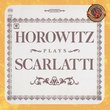
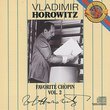
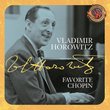
![Horowitz Live and Unedited [includes Bonus DVD]](https://nationalbookswap.com/cd//m/60/1660/6111660.jpg)
